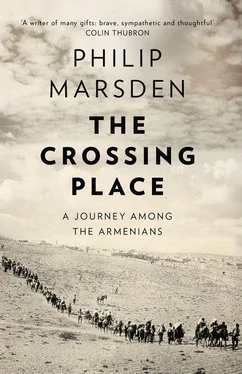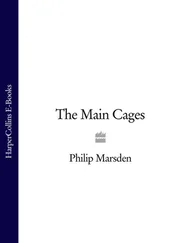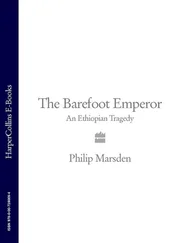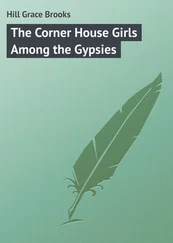I stood up from the desk in my room and went to the window. The rain was falling with a tropical ferocity. It sluiced off the flat roofs and filled the headlight beams of the traffic – bobbing Buicks, battered Mercedes, empty trucks swishing into the night. A pack of wild dogs splashed through the puddles. Two Lebanese soldiers crouched beneath their rain-capes on the turret of a tank. Then for an instant Beirut was lit up by lightning and the thunder again took a whip to the hills.
There was a knock on my door. A young priest holding a candle said His Holiness would like to see me. I followed him through the darkened passages to a room with a great arched window that rose from the floor and surveyed the courtyard below. Often I had looked up at that window and watched the bishops pace behind it like caged birds. Now the rain spotted its surface and ran down it in wide rivulets. The Catholicos sat alone watching it in the dark, preying on a large cigar.
‘Please, sit down,’ he said.
We sat in silence for a moment, looking out at the rain.
‘You will not see me again,’ he announced.
‘Oh?’
‘Lent is coming and I am tired. I shall go to Oxford to rest.’
‘A retreat?’
‘A retreat.’ He looked away and again we were silent while the rain hissed outside. The Catholicos looked down on the flooded courtyard like a brooding general. Then he asked, ‘And you?’
‘Damascus,’ I said. ‘I will leave tomorrow for Syria.’
‘You will have trouble in Syria.’
‘I was hoping perhaps you could help me cross the border.’
‘I will leave a letter for you, but I would not go to Syria. The police will make trouble.’
I could not tell him that in fact I would be relieved to be out of the Lebanon, that at least in Syria there were police. So I thanked him for his advice and for all his help, and wandered back through the unlit cloisters to my room.
Early the next day an Armenian photographer took me into Bourdj-Hamoud to find a lift to the Syrian border. It was a bright morning. The night’s storm had left its mark in shining pond-sized puddles and the traffic was heavy. Cars queued three deep at the checkpoints, impatient to get into the city to trade and shop and busy themselves in the Beiruti way. No one, except me, seemed at all bothered that in about twelve hours’ time the deadline for the land offensive in Kuwait was due to expire.
Coming through the checkpoints in the other direction were dozens of vehicles with skis strapped to the roof. That year on Mount Lebanon the snow had been frightfully disappointing.
‘Terrible,’ the photographer lamented. ‘All thin and slushy.’
‘I’m sorry to hear it,’ I said.
‘But this year they are all going skiing. If there’s one thing the Beirutis are good at, it’s forgetting,’ he chuckled. ‘I mean, does this seem to you like a city that’s been sixteen years at war?’
‘Yes,’ I said. ‘It does.’
History will search in vain for the word ‘Armenia’.
Winston S. Churchill
After all, who now remembers the Armenians?
Adolf Hitler, discussing use of his death-squads
The main road from Beirut to Damascus had only been open a few weeks. Lebanese government forces controlled it to the pass below Mount Lebanon, Syrians beyond that. Shared taxis had begun to ply the route between the two cities, braving the checkpoints for the sake of a good fare.
Looking back down towards Beirut, it could have been any Mediterranean town with its bushy-pine slopes and the dust and the terraces and the olive groves. From a distance it looked like Nice or Genoa. But the road was scarred with tank tracks and by the time we reached the abandoned hill resorts of Aley, Sofar and Bhamdoun all the villas – once the summer courts of the Gulf sheikhs – were utterly destroyed. At the pass of Dahr-al-Baidar, where the Syrians took over, fog brushed the mountain slopes and piles of snow lay beside the road. At the checkpoint, an old Volvo burst into flames. The Syrian soldiers dashed about in a panic, piling snow on the bonnet to smother the fire, barking orders, letting the traffic through without question. The Armenian taxi-driver accelerated past them with relief and we started the long, sweeping descent towards the Bekaa valley.
For me, the Bekaa embodied all the most dangerous aspects of the Middle East. From years of news reports and hearsay, I imagined a place something akin to the Valley of the Shadow of Death or one of the inner circles of Hell. I saw a dark shadowy declivity into which crawled extremists too extreme for Beirut; I pictured Western hostages tied to the bottom of cars and, from above, Israeli planes bombing and strafing its southern reaches. Out of the valley came trained terrorists and hashish (for both of which it was the world’s leading supplier), and each year the Syrians earned more than a billion dollars from the opium. Even its name sounded dark and threatening: Bekaa – like a rifle shot or a cry of jihad.
So it was a surprise to find that the valley was very beautiful, that the Hizbollah and their hostages woke to mornings of a brilliant, feverish light; that the militias – Palestinian, Shiite, Kurdish – could run their combat training against a backdrop of sensuous, flesh-smooth slopes. But I was pleased to get across it, through the narrow corridor of Syrian control, up to the Lebanese frontier on the far side. At the Syrian border beyond, I waited seven hours for a visa. President Assad scrutinized me from three walls with his benign bank-manager’s stare.
Just before four o’clock, an official summoned me to the desk. ‘Border closing.’
‘My visa?’
‘ Bukra. Tomorrow.’
‘Tomorrow Damascus will say yes?’
‘Maybe yes, maybe no.’
Damn you. I was now caught in no man’s land – unable to get into Syria, and unable to re-enter Lebanon; I’d used up my ‘une seule visite’ visa.
Only a few carefully placed US dollars eased me back across the Lebanese border, back into the Bekaa. In a few hours’ time the allied forces would launch their offensive in Kuwait and the Bekaa Valley was the last place I wanted to be.
Once again the Armenians were able to offer me protection. Just up from the border post I found the village of Anjar, where a series of bubbling springs leave a smudge of green on the dry slopes. The village was made up entirely of Armenians and they welcomed me in. Just outside, the Syrian secret police had set up camp. I didn’t think I had much to thank them for, but the sight of all their military hardware between me and the Hizbollah was something of a relief.
There was a doctor named Caspar who ran an occasional clinic in Anjar. I’d met him in Beirut but today he was here. I found him in his surgery with a queue of patients; he said he’d be half an hour and advised me not to leave the building. So I waited beneath the anatomical diagrams and listening to the stern advice to young mothers, reflecting that in fact I was glad to be in Anjar, to have the opportunity to trace one of 1915’s few episodes of successful defiance.
The story of Anjar is a story of exile and return, and exile again. A conglomerate of six old Armenian villages, Anjar’s people came originally from an area around the mountain of Musa Dagh, at the far northern end of the Levantine coast. The town is divided into six segments, which retain the names of the villages that they left. When in July 1915 the deportation order reached Musa Dagh, Armenian opinion was divided. Some said they should resist. Others saw there was no point; the Turkish forces were far too strong and the order, after all, was only for deportation. About sixty families complied with it. They were never seen again.
Читать дальше












